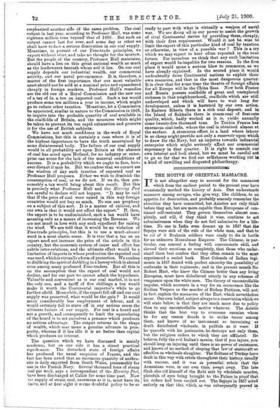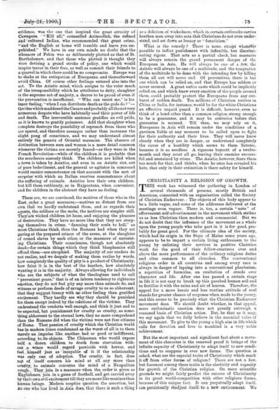THE MOTIVE OP ORTENTAL MASSACRE. I . T is not ' altogether
easy to account for. the massacres which from the earliest period to the present year have occasionally marked the history of Asia., understands massacre among savages, who give way, lie children, to an appetite for destruction, and probably scarcely remember the atrocities they have committed, but Asiatics not only Ainli before they act, but are more capable than Europeans of cop. tinned self.restraint. They govern themselves almost cora- pletely, and will, if they think it wise, continue to act submissiveness when they do not feel 'submissive for a life. time. No one in tnclia even dreamt up to 1857 that the Sepoys were sick of the rule Of the White man, and that to be rid of it Brahmin soldiers were ready to die in battle for an unknown Mussulman Emperor. The Chinese, in par- ticular, can conceal- a feeling with consummate skill, end shroud their emotions so completely, that those who under- stand them best confess that they often remain to the most experienced a sealed book. Most Colonels 'of Indian regiments in 1857 denied with perfect sincerity the possibilityof outbreaks in' their regiments ; and in the present month Sir. Robert Hart, who knew the Chinese better than any living European, must have disbelieved utterly in- any schemes Of vengeance upon the white men. The theory of uncontrollable impulse, which accounts in a way for 'an occurrence like the Sicilian Vespers or the murder of Bishop Pattion,.will.nOt; in fad, explain the massacres of the' East, whichneverthelest occur. Our own belief, subject always to a reservation which we Will state below, is that they are much more duo to. policy than to any uncontrollable motive-whatever.. The Asiitio thinks that the best way to Overcome enemies. whom he for any reason dreads is to. strike terror . among there, sad knows of- instrument- terrorising as death distributed whoesale, in pailfuls as it were; If he' quarrels with his janissaries; he destroys' not:-Only than; but the' religious orders to which-they •are affiliated. ' HO believes fully the.evil maxim, that if you injure, you- should keep On' injuring until there 15 lie powerof .resistance; and latows.of no method Of 'obeying that ra,-irof statecraft 'so effeave as wholesale slaughter. TheStiltainfof Ttirkey.haVe• dealt in this way with rebels throughout- their hietbry,Usually with success, and it was is -poterifial:'Irebela; tbat the Armenians were, in Our own tinie,:• Swept :The lito Shah also rid-himself of -the Babi- Soot wholdiale murder, platefuls of *eyes being brought to the Palace in pr9f that his orders had' been Cariiict out The SepOyiln -1857 .a,aed entirely on that idea, Which; as Was itibsequently proved in evidence, was the one that inspired the great atrocity of Cawnpore. - "Kill all," counselled Azimoollah,- the refined eüd cultured Indian, who recommended that great crim, " and-the English at home will tremble and leave you zni- puizished." We have in our own minds no doubt' that the nfaisa,cre of Pekin was as deliberately plotted as that of St. Bartholomew, and that those who plotted it thought they Were. devising a grand stroke of policy, one which would inspire terror in their foes, as well as commit their friends to a:tinarrel in Which there could be no compromise. Europe was to shake at the extirpation of Europeans, and thenceforward avoid China. Of course other feelings entered also into the act. To the Asiatic mind, which assigns to the ruler much of the irresponsibility which he attributes to deity, Slaughter is the supreme act of majesty, a decree to be proud of even if the provocation is insufficient. "Who can resist me," is his bluer feeling, "when lean distribute death as the gods do ?
the idea, which znaddenedthe Clesars and probably all the not very numerous despots who have habitually used their power of life and death. The irreversible sentence grates an evil pride, as it is known to gratify poisoners. Add that slaughter when complete destroys the possibility of reproach from those who are spared, and therefore assuages rather than increases the slight pang of conscience, and we may understand . almost entirely the genesis of Oriental massacre. The absence of distinction between men and women is a mere detail common whenever the victims are secretly feared—as they were in the French Revolution—while of the children it is probable that the murderers scarcely think. The children are killed when a town is taken by Asiatics, and even in an Asiatic riot, out of pure bedevilment, and the general or agitator in command would receive remonstrance on that account with the sort of surprise- with which an Italian receives remonstrance about the suffering of animals. Asiatics love their own children, but kill them ruthlessly, as in Rajpootana, when convenient, and for children in the abstract they have no feeling.
These are, we are convinced, the motives of those who in the East, order a great massacre,—motives so distant from our, own thrit we hardly undetstand them, and as regards their agents, the, soldiers or the mobs, the motives are simpler still. Tiejr!li.ile wicked children let loose, and enjoying the pleasure of destruction.. They have no more idea that they are steep- ing themselves in crime, "damning their souls to hell," as Most Christians think, than the Romans had when they sat gazing at the prepared crimes of the arena, at the slaughter of armed slaves by each other, or, the massacre of unresist- ing Christians. Their consciences, though not absolutely dead—for certain things, which they think blasphemies still offend them—are atrophied. The majority of our readers do not realise, and we despair of making them realise by words, how completely the quality of pity is a product of Christianity, hew faint.it..js. in the best of the heathen, how absolutely wanting it is in the majority. Always allowing for individuals Who. are the subjects of what the theologians used to call " lite.venient grace," that is of an inborn tendency to righteous emotion, they. 40 not feel pity any more than animals do, and witness or perform deeds of savage cruelty to us so abhorrent; that they suggest lunacy with no other feeling than gratified excitement. _ They hardly see whrthey should be punished for:them except indeed by_the relations of the victims. They understand :the vendetta well enough, and think it just and to be expected,bzit punishment for cruelty as cruelty, as some- thing.abhorrent to the eternal laws, they no more comprehend than the Romans did when the victims were not free citizens eiRcizae. • That passion of cruelty.which the Christian world has in modern times condemned as the worst of all is to them merely an _impuh3e , like_ another, bad or good or indifferent, according to_ ite objects. :'The Chinaman who would expose half . a. dozen children to death from starvation with- ont _ wince would ,12egara parricide with hewer, and feel himself just as • incapable of it if the relationship INS only one of _adoption. The cruelty, in fact, does not of_ : itself. concern his Mind, at all any More than ernelty:, to animals concerns the mind of a Neapolitan rongh.... They :jOin in a massacre when the order is given as Englishmen join in a_game of football, an get carried away by their own evil excitement till they are more like maniacs than human _Modern sceptics question the assertion, but .no One who has lived in Asia does, that there is such a thing as a delirium of wickedness, which in certain outbreaks carries heathen men away into acts that Christians do not even under- std, and set down as lunacy or "fanaticism."
What is the remedy ? There is none, except wherieUr possible to inflict puiiishment with inflexible, but discrimi- nating rigour. That acts as a partial check, but massacie will always remain the grand permanent danger of the European in Asia. He will always be one of a few, the' Asiatic will always be one of a multitude, and the temptation of the multitude to be done with the intruding few by killing them all out will never end. Of preventives, there is but one which can be relied on, and that Europe has seldom or never secured. A great native caste which could be implicitly relied on, and which knew every emotion of the people around them, could probably protect the Europeans from any out- burst of sudden death. Ten millions of Christian natives in China or India, for instance, would be for the white Christians an effective unpaid guard. It is difficult, however, even to think of a bond other than a common religion strong enough to be a 'guarantee, and it may be centuries before that guarantee is secured.:. Till then, we may rely on it, Europeans in Asia will remain under the conditions of a garrison liable at tiny moment to be called upon to fight for their authority and their lives. They will never know clearly when they are in danger, or understand completely the cause of a hostility which seems to them 'Satanic, because it is so needless. A rigorous boycott of a twelve- month and they must all go, leaving their, enemies- success- ful and unstained by crime. The Asiatic, however, fears them too much for that, and thinks, when he once has revealed his hate, that only in their extinction is there safety for himself.



































 Previous page
Previous page